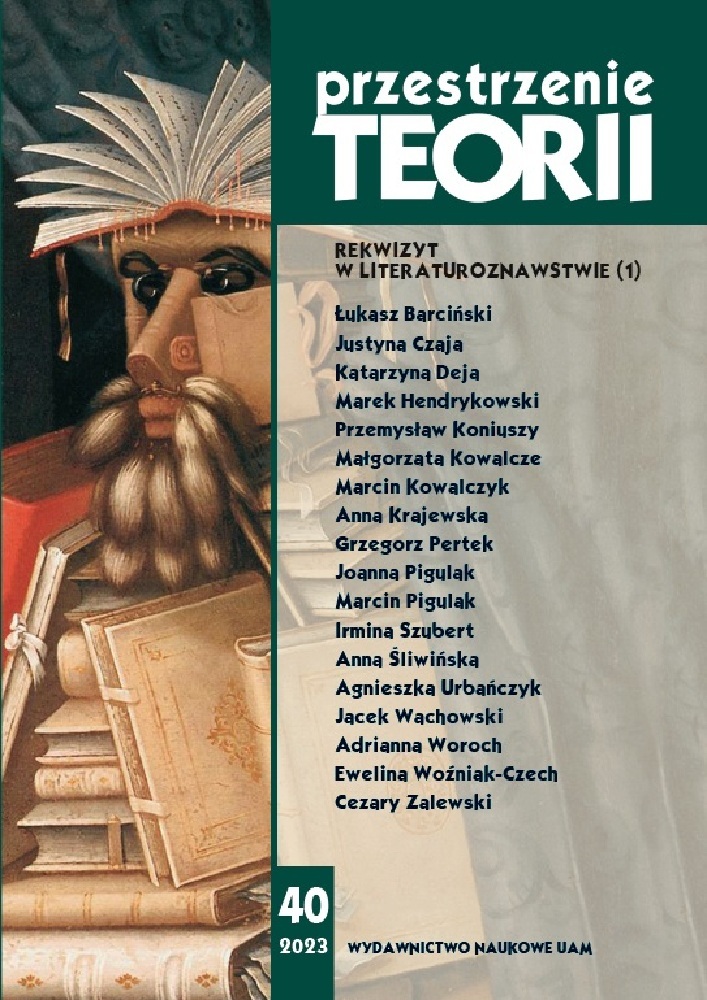Abstrakt
The article discusses the novel The Land of Decoration by Grace McCleen’s applying elements of selected posthumanist theories, mainly object-oriented ontology (G. Harman, T. Morton) and new materialism (J. Bennett). It considers the assumption that in the novel, the ontological status of human beings as well as material objects is fluid, as both play the role of a prop and the entity manipulating the prop. The author focuses on the main character’s religious cognitive perspective and her relations with her (im)material surroundings. An attempt is made to point out certain similarities between the religious worldview and the posthumanist approach. To this end, the author discusses several issues related to the dualistic categories of material vs. immaterial, rational vs. irrational, as well as human vs. non-human.
Bibliografia
Bennett J., The Enchantment of Modern Life: Attachments, Crossings, and Ethics, Princeton 2001. DOI: https://doi.org/10.1515/9781400884537
Bennett J., Vibrant Matter. A Political Ecology of Things, Durham and London 2010. DOI: https://doi.org/10.1215/9780822391623
Brinton L., ‘Represented Perception’: A Study in Narrative Style, „Poetics” 1980, nr 9, s. 363–381. DOI: https://doi.org/10.1016/0304-422X(80)90028-5
Buchanan I., Assemblage Theory, or, the Future of an Illusion, „Deleuze Studies” 2017, nr 11(3), s. 457–474. DOI: https://doi.org/10.3366/dls.2017.0276
Charles R., „The Land of Decoration”, by Grace McCleen, „The Washington Post” 2021
(March 20), https://www.washingtonpost.com/entertainment/books/the-land-of-decoration-by-grace-mccleen/2012/03/12/gIQA5WS8PS_story.html (dostęp: 5.09.2023).
DeLanda M., Assemblage Theory, Edinburgh 2016, Chapter one. DOI: https://doi.org/10.1515/9781474413640
Domańska E., Humanistyka nie-antropocentryczna a studia nad rzeczami, „Kultura Współczesna: teoria, interpretacje, krytyka” 2008, nr 3, s. 9–21.
Domańska E., Luka paradygmatyczna we współczesnej humanistyce, [w:] Mody. Teorie i praktyki, red. E. Winiecka, Poznań 2018, s. 17–32.
Gaige A., „The Land of Decoration”, by Grace McCleen, „The New York Times” 2012 (June 22), https://www.nytimes.com/2012/06/24/books/review/the-land-of-decoration-by-grace-mccleen.html (dostęp: 12.09.2023).
Graham E., Cyborg or goddess? Religion and posthumanism from secular to postsecular, „Journal of Posthumanism” 2020, nr 1, s. 23–31. DOI: https://doi.org/10.33182/jp.v1i1.1444
Graham E., Manifestations of the posthuman in the postsecular imagination, [w:] Perfecting human futures: Transhuman visions and technological imaginations, red. J.B. Hurlbut, H. Tiroh-Samuelson, New York 2016, s. 51–72. DOI: https://doi.org/10.1007/978-3-658-11044-4_3
Harman G., Object-Oriented Ontology: A New Theory of Everything, London 2018. DOI: https://doi.org/10.1093/acrefore/9780190201098.013.997
Harman G., On the Undermining of Objects: Grant, Bruno, and Radical Philosophy, [w:] The Speculative Turn: Continental Materialism and Realism, red. L. Bryant, G. Harman, N. Srnicek, Melbourne 2011.
Harman G., The Quadruple Object, Alresford 2011.
Harman G., Traktat o przedmiotach, przeł. M. Rychter, Warszawa 2013.Iovino S., Opperman S., Material Ecocriticism: Materiality, Agency and Models of Narrativity, „Ecozon@” 2012, vol. 3, nr 1, s. 75–91. DOI: https://doi.org/10.37536/ECOZONA.2012.3.1.452
Kowalcze M., Bezwładność tożsamości. Williama Goldinga „Siłą Bezwładu” w perspektywie ontologii zorientowanej na przedmiot, „Przestrzenie Teorii” 2021, nr 35, s. 103–123. DOI: https://doi.org/10.14746/pt.2021.35.4
Mantin R., A Thealogy of Radical Immanence: Goddess and the Posthuman, „Feminist Theology” 2019, nr 28(1), s. 6–19. DOI: https://doi.org/10.1177/0966735019857194
Maslin J., Armageddon and Other Playthings, „The New York Times” 2012 (March 21), https://www.nytimes.com/2012/03/22/books/the-land-of-decoration-by-grace-mccleen.html (dostęp: 10.09.2023).
McCleen G., Świat Judyty, przeł. K. Petecka-Jurek, Katowice 2013.
Morton T., Hyperobjects. Philosophy and Ecology after the End of the World, Minneapolis–London 2013.
Pismo Święte Starego i Nowego Testamentu, wyd. V, Poznań 2014.
Weber M., Polityka jako zawód i powołanie. Wybór pism, przeł. P. Dybel, Kraków 1998.
Licencja
Prawa autorskie (c) 2023 Małgorzata Kowalcze

Utwór dostępny jest na licencji Creative Commons Uznanie autorstwa – Użycie niekomercyjne – Bez utworów zależnych 4.0 Międzynarodowe.
Autorzy
Autorzy tekstów przyjętych do publikacji w czasopiśmie „Przestrzeniach Teorii” są zobowiązani do wypełnienia, podpisania i odesłania na adres redakcji umowy o udzielenie nieodpłatnej licencji do utworów, z zobowiązaniem do udzielania sublicencji CC.
Zgodnie z umową, autorzy tekstów opublikowanych w czasopiśmie „Przestrzeniach Teorii” udzielają Uniwersytetowi im. Adama Mickiewicza w Poznaniu niewyłącznej i nieodpłatnej licencji oraz zezwalą na użycie sublicencji Creative Commons Attribution-NonCommercial-NoDerivatives 4.0 International (CC BY-NC-ND 4.0).
Autorzy zachowują prawa do dalszego, swobodnego rozporządzania utworem.
Autorzy, którzy wykorzystują w swoim tekście cudze utwory (np. ilustracje, fotografie) proszeni są o dostarczenie do redakcji czasopisma zgodę na publikację od uprawnionych podmiotów.
Użytkownicy
Zainteresowani użytkownicy internetu uprawnieni są do korzystania z utworów opublikowanych po 2015 roku „Przestrzeniach Teorii” tylko w calach niekomercyjnych, pod następującymi warunkami:
- uznanie autorstwa - obowiązek podania wraz z rozpowszechnionym utworem, informacji, o autorstwie, tytule, źródle (odnośniki do oryginalnego utworu, DOI) oraz samej licencji;
- bez tworzenia utworów zależnych - utwór musi być zachowany w oryginalnej postaci, nie można bez zgody twórcy rozpowszechniać np. tłumaczeń, opracowań.
Do wszystkich tekstów opublikowanych przed 2015 r. prawa autorskie są zastrzeżone.
Inne
Uniwersytet im. Adama Mickiewicza w Poznaniu zachowuje prawo do czasopisma jako całości (układ, forma graficzna, tytuł, projekt okładki, logo itp.).

